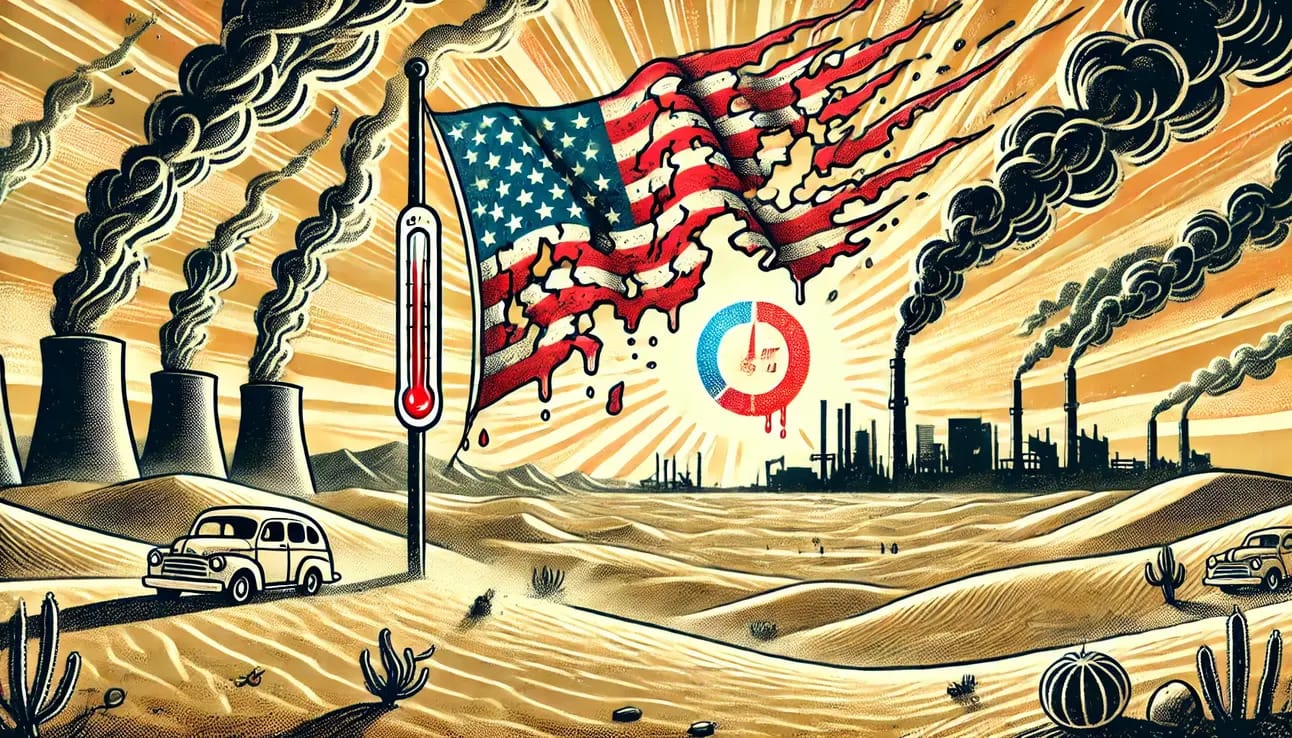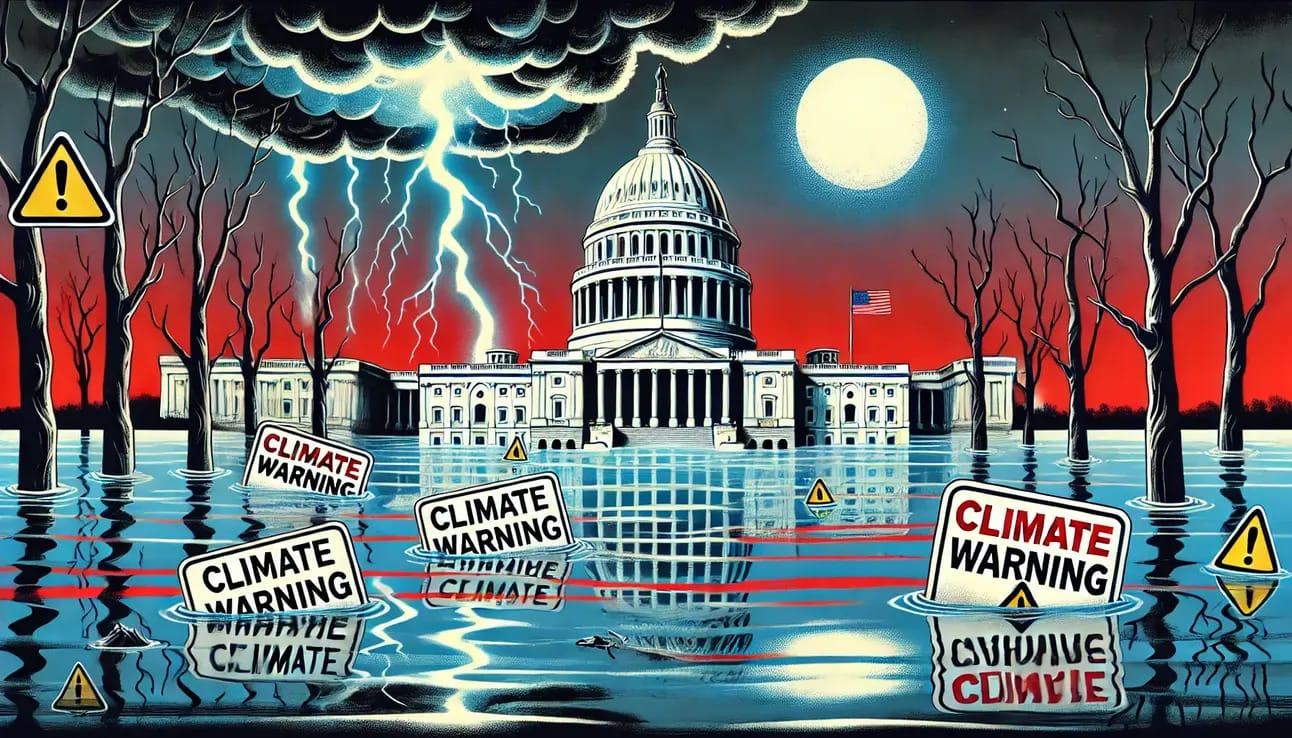- Green Glow
- Posts
- 🌱 Why Trump's Latest Move on Climate Should Alarm Every American 🔥🚨
🌱 Why Trump's Latest Move on Climate Should Alarm Every American 🔥🚨
Trump’s new executive order seeks to block state climate change laws, sparking controversy over environmental policy and states' rights. Learn why this move should concern every American.
Stay up-to-date with AI
The Rundown is the most trusted AI newsletter in the world, with 1,000,000+ readers and exclusive interviews with AI leaders like Mark Zuckerberg, Demis Hassibis, Mustafa Suleyman, and more.
Their expert research team spends all day learning what’s new in AI and talking with industry experts, then distills the most important developments into one free email every morning.
Plus, complete the quiz after signing up and they’ll recommend the best AI tools, guides, and courses – tailored to your needs.
On April 8, 2025, President Donald Trump signed a sweeping executive order aimed at blocking state-level climate change laws. This move, framed as a defense of “American energy dominance,” directs the U.S. Attorney General to challenge or nullify any state policy that restricts fossil fuel use, promotes environmental justice, or addresses carbon emissions.
While this may appear to some as just another political maneuver in the ever-polarized debate over climate change, it marks a significant escalation in federal overreach—and a direct threat to both environmental progress and the principle of states’ rights. Every American, regardless of political affiliation, should be paying close attention.
Table of Contents

At the heart of this order lies a profound constitutional challenge: Can the federal government override states’ rights to regulate their own environmental and energy policies?
Historically, states have led the charge on climate action, especially in the absence of strong federal leadership. California’s cap-and-trade program, New York’s efforts to hold polluters financially accountable, and Vermont’s aggressive decarbonization targets are just a few examples of locally driven innovation in the fight against global warming.
By targeting these initiatives, Trump’s order doesn’t just attack climate policy—it attacks the foundational concept of federalism, where states retain the authority to act in their citizens’ best interests.
The Environmental Consequences
Blocking state climate policies doesn’t just slow progress—it actively accelerates environmental harm. While the science around climate change is well-settled, this executive order ignores decades of data and the reality of worsening natural disasters.
Disabling state-level initiatives will:
Delay the reduction of harmful greenhouse gas emissions
Undermine clean energy development and innovation
Increase public health risks tied to air and water pollution
Make it harder to meet international climate commitments like the Paris Agreement
These are not abstract concerns. They’re measurable, immediate, and life-affecting—especially for frontline communities already burdened by pollution and climate-driven disasters.

A Win for Fossil Fuels, A Loss for Americans
The timing of the executive order is telling. It came on the same day as another order to ramp up coal production, a clear signal that the administration is prioritizing fossil fuels at the expense of clean energy and environmental protection.
The American Petroleum Institute cheered the move, while clean energy advocates and environmental organizations sounded the alarm. But what does this mean for the average American?
It means:
Higher long-term energy costs as clean tech is stifled
Job losses in the renewable energy sector, one of the fastest-growing industries in the U.S.
More frequent and costly disasters fueled by climate inaction
Weaker global competitiveness as other nations accelerate their green transitions
A Threat to Democracy and Accountability
Perhaps most concerning is the executive order’s broader political implication: it signals a federal government that seeks to insulate powerful polluters from legal and financial accountability.
By intervening in state lawsuits and penalties against fossil fuel companies, the federal government may effectively grant corporate immunity for decades of environmental damage. That’s not just bad policy—it’s a breakdown in democratic accountability.
The Path Forward: Resistance and Resilience
In response, governors from the U.S. Climate Alliance have pledged to continue their efforts. “We will keep advancing solutions to the climate crisis,” they said in a joint statement, reaffirming their commitment to clean energy, job creation, and public health.
Their resolve matters. But so does public pressure.
This is a moment for civic engagement. Americans must demand that their state and federal representatives oppose this order and uphold the right of states to lead on climate action. The future of the country’s environmental health—and democratic balance—depends on it.

Conclusion
President Trump’s executive order isn’t just a bureaucratic move. It’s a direct challenge to environmental protection, state autonomy, and public welfare. The consequences—legal, environmental, economic, and moral—are too great to ignore.
No matter where you live or who you vote for, this should alarm you. Because what’s at stake isn’t just policy—it’s the planet we all share.
FAQs
What did Trump’s April 2025 executive order do?
The order directs the U.S. Attorney General to identify and challenge state laws that regulate climate change, reduce fossil fuel use, or promote environmental justice. It aims to block enforcement of such laws, framing them as threats to "American energy dominance."
Why is this order controversial?
It undermines state-level authority to pass environmental laws, challenges the separation of powers between federal and state governments, and reverses progress on combating climate change. Critics argue it prioritizes fossil fuel interests over public health, environmental safety, and clean energy innovation.
Which states are being targeted?
The order specifically calls out New York and Vermont’s penalties for fossil fuel companies, California’s cap-and-trade program, and state lawsuits holding energy companies accountable for climate damage.
How are states responding?
Governors from the U.S. Climate Alliance have vowed to continue their efforts despite the order. They assert that states have the right—and the duty—to act in defense of clean air, water, and climate stability.
What does this mean for everyday Americans?
If upheld, the order could lead to increased pollution, slower clean energy development, higher costs from climate-related disasters, and reduced accountability for fossil fuel companies. It also poses long-term risks to health, jobs, and national environmental goals.
You May Also Like
🌱 Clean Power Hits 40%, But Emissions Still Rise – What’s Going On? 🌞🤔
🌱 Climate Chaos is Here: How Extreme Weather is Reshaping Our World 🌍🔥
🌱 Powering Peace: How Renewable Energy Can Stabilize the Central African Republic 🕊️🌍
🌱 The Fight Against Plastic Pollution: Can a Global Treaty Still Succeed? 🌍♻️
External Links
Follow Us:
X: https://www.x.com/greenglownews
Youtube: https://www.youtube.com/@greenglownews
Instagram: https://www.instagram.com/greenglownews
Sponsored Links

